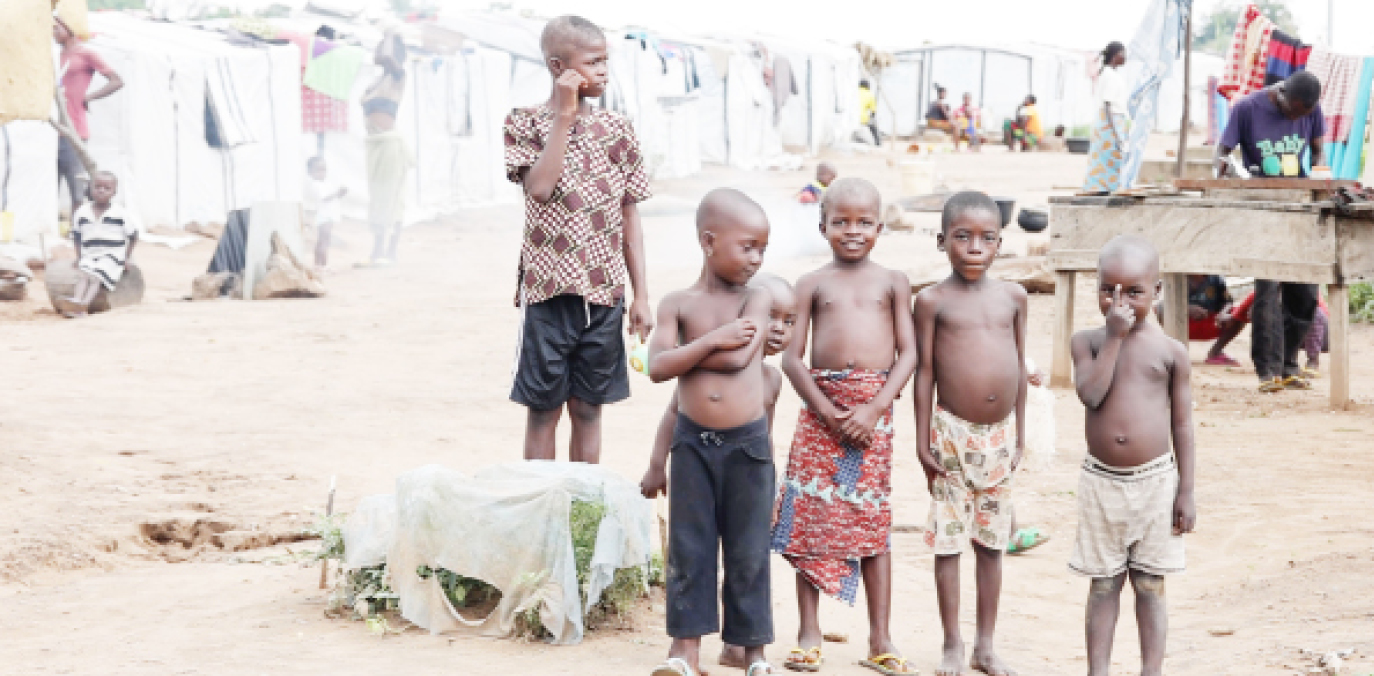Mixed reactions have greeted the federal government’s plans to shut down internally displaced persons (IDPs) camps across the country.
The humanitarian crises in states across the country, especially Borno (North-East) and Benue (North-Central) occasioned by the Boko Haram insurgency as well as farmer/herder conflicts have turned millions of people into Internally Displaced Persons (IDPs) in the states.
- PODCAST: Will E-Transmission of Results Give Power to The Electorates?
- FG budgets 14.6bn for ‘suspended’ national carrier project in 3 years
The Federal Commissioner, National Commission for Refugees, Migrants and Internally Displaced Persons (NCFRMI), Imaan Sulaiman-Ibrahim, on Wednesday said the federal government was making plans to close down the Internally Displaced Persons (IDPs) camps and empower the displaced people to become productive and reintegrate into the society.
Speaking in Abuja after the inauguration of the NEMA-NCFRMI collaborative focal team on IDPs, Imaan said government did not envisage the IDPs staying in camps for such a long time, hence the need to ensure that they come up with better ways to ensure that the camps were closed down.
“Initially, we didn’t expect them to stay till now. They have overstayed in the camps for years now; we now have to devise better ways in ensuring we close down the camps.
“We can’t continue looking after people that are able to contribute to nation-building. We have to provide them with an environment and platforms to key in and become contributing members to nation-building,” she said.
The federal commissioner noted that once they were out of the camps, they would be provided with the necessary platforms and environment to start something productive and contribute their quota to nation-building.
Borno, Benue react
But while the Borno State government has welcomed the plan by the federal government to close IDPs camps, Benue State wants the federal government to fulfil its rehabilitation promise to the state to enable it to put in place certain measures before closing the IDP camps.
Findings show that the total population of functional IDP camps in Borno State is 245 made up of 190,591 households with a total of 831,321 individuals. Among them are 353, 697 boys (0-18 years), 442,129 girls (0-18 years), 23,116 pregnant women, and 62,813 lactating mothers, 1,581 persons living with disabilities, 1,201 separated minors, and 941 unaccompanied kids.
These figures were confirmed by a senior officer with the National Emergency Management Agency who also said in the various camps are 6,063 orphans (children), 16,578 elderly men, and 1,891 elderly women.
According to the officer, a total of 130,056 were returnee households in the state consisting of 740,595 individuals.
The Senior Special Assistant to the Borno State Governor on Media, Baba Sheikh Haruna, said like the federal government, the state authorities were working day in day out to resettle all displaced persons and shut down all IDP camps before the year runs out as part of their post-insurgency recovery framework.
He said Governor Babagana Umara Zulum had ordered the construction of houses in addition to 10,000 being constructed by the federal government for the resettlement of displaced persons whose homes were either destroyed or damaged by the insurgents.
Already, some houses have been delivered and have been allocated to some displaced families.
According to him, the government had in May closed down the camp in Mohammed Goni Islamic and Legal Studies, Maiduguri, for full academic activities to recommence while all the 500 households there have been resettled in other places.
Among them were displaced families that were willing to return to their ancestral homes resettled in Damasak while those who chose to stay in Auno were resettled in the newly completed houses there; the remaining who chose to stay in Maiduguri city were given rent subsidy to rent houses.
Most of the displaced persons, including those resettled in Marte town after spending years in Monguno, have actively engaged in farming and other genuine ways of acquiring the necessities of life. This applies to returnees in other towns including Gwoza, Banki, Pulka, Bama, Damasak, Monguno, Baga and Doron Boga.
‘Follow international standards’
But the chairman of the Network of Northeast Civil Society Organizations, Amb Ahmed Shehu, advised that closing the camps should be done according to the Kampala Convention.
“In respect of camps across the federation, let me say that no nation would like to see its citizens displaced and suffering but here with this circumstance it has become a necessity. So the question is where are they going to be relocated to? Is the place safer and accessible? How are they going to sustain themselves?
“If a community is relocated from Maiduguri to the local governments what happens is that most actors, like international organizations and supporting organisations, tend to prioritize new arrivals rather than returnees.
“Our advice as civil society organizations is that every relocation should consider the international standard and it should be guided by the Kampala Convention. They must consider the safety of the returnees,” Shehu said.
Daily Trust reports that the Benue State Government had consistently asked the federal government to fulfil its rehabilitation promise to the Internally Displaced Peoples (IDPs) so they can return to their ancestral homes.
A document obtained from the State Emergency Management Agency showed over a million IDPs in the camps covering between 2019 and 2021 as of April 2021.
Our correspondent reports that there are at least 27 officially recognised Internally Displaced Persons (IDPs) camps in seven local government areas of Benue State.
The Head of the Benue State Emergency Management Agency (SEMA), Dr. Emmanuel Shior, had severally made the appeal to the federal government.
Shior had reportedly said that the decision not to close the camps in Benue was viewed from the humanitarian perceptive.
“From the humanitarian perspective, you have to put certain measures in place before you can ask them to go back. Recall that the federal government had visited Benue through Vice President Yemi Osinbajo and during the visit, he promised that the federal government would construct housing units in three local governments of the state which include; Logo, Guma, and Agatu, as part of resettlement arrangements but since then, we have not heard anything,” he said.
The BENSEMA boss added that the state government donated a vast parcel of land for the federal government’s project of the resettlement of the IDPs, stressing that until the process is concluded, the displaced people wouldn’t leave the camps for government to close them.
Mbaikpeveyor Mkoholga, a 55-year-old widow at the IDP camp located at Daudu in Guma Local Government Area, said having stayed at the camp since 2018 she wants to go back home.
She, however, expressed concern over security saying: “Government should first of all end these attacks before allowing us to go back.”
Another IDP, Rosemary Iorpuu, also expressed eagerness to return home but was quick to point out that if security measures are not in place there could be further attacks.
“As farmers, we also need to return to our farms but we are afraid of being attacked again by herders. So government should end this crisis before asking us to go home,” she said.
We are willing to go home but…IDPs
Some internally displaced persons spoken to in Borno and Benue however expressed their desire to return to their ancestral homes but expressed concern over their security.
An IDP from Guzamala Local Government Area of Borno State, Malam Gulumbali Bukar, told our correspondent that they all want to go back to their communities but the place was neither occupied by soldiers nor by police saying it would be difficult for them to return except normalcy happens.
“The government is right to say that but they have to make sure that our local government is safe enough. They should not be deceived that Boko Haram is finished. There are thousands of them at Lake Chad Basin; we can’t go back except we are sure of our safety.
“We are tired of staying at displaced persons camps; we know there is dignity here but we believe that when there is life there is hope. The federal government should end insurgency and insecurity in the land before thinking of returning us. We tried it three years ago but in less than 30 days Boko Haram sent us away,” Bukar said.
Another displaced person from Mobbar LGA, Mohammed Haruna, frowned at the decision claiming that the northern part of the state was not yet safe.
“The state government knows that our place is not safe now and Governor Babagana Zulum should tell Buhari about this. I have been staying here for six years; I don’t like it but do I have a choice? I have lost everything including two sons to Boko Haram. So it will be a dangerous thing to return us when the place is still controlled by insurgents,” Haruna said.
By Fidelis Mac-Leva, Maureen Onochie (Abuja), Misbahu Bashir, Olatunji Omirin (Maiduguri) & Hope Abah Emmanuel ( Makurdi)

 Join Daily Trust WhatsApp Community For Quick Access To News and Happenings Around You.
Join Daily Trust WhatsApp Community For Quick Access To News and Happenings Around You.


